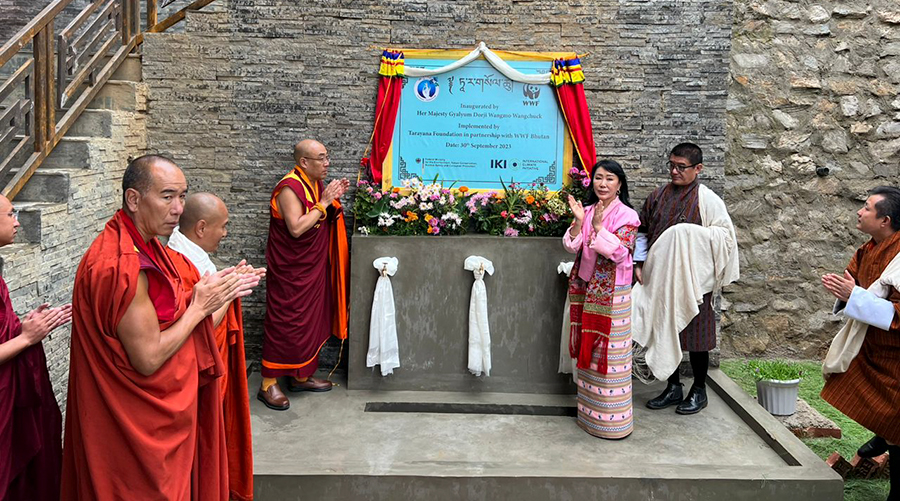
Her Majesty Queen Mother Dorji Wangmo Wangchuck inaugurated several drinking water facilities incorporated through nature-based solutions in Paro yesterday. The facility will benefit seven villages and a monastery in Dogar Gewog. The nature-based solution involves collecting spring water and distributing it using natural objects such as bamboo and wood. Tarayana Foundation and World Wildlife Fund Bhutan implemented the project.
To supply drinking water using nature-based solutions, the project established spring recharge areas, water filtration systems, reservoirs and pipelines.
The process involves collection of spring water which is then passed through the wood intake tank with bamboo charcoal filtration. The filtration consists of aggregate, sand, pebbles and bamboo charcoal.
Finally, through the wooden chamber, it goes to the cement water filtration, then to water reservoir, and from there it is supplied to the residents.
The water reservoir has a capacity of about 100,000 litres.
The nature-based solution is the first of its kind in the country which generates clean drinkable water.
“The spring shed intervention was started this year from Dogar Gewog after an assessment carried out in 2020,” said Passang Tobgay, a senior field officer of the Tarayana Foundation.
“As part of the project, we are supporting the livelihoods of the local communities of nine Dzongkhags. We are supporting the activities in terms of securing the water recharge areas, enhancing water distribution systems, and building capacities of local communities in terms of water management,” said Tandin, the programme coordinator of the World Wildlife Fund Bhutan.
Besides catering to the immediate water requirements of local communities, it will also promote sustainable water management and foster human-wildlife coexistence.
Officials from the Tarayana Foundation said a dedicated water flow is developed to facilitate animal access, thereby deterring wild animals from entering the village.
Through this project, monks of Sali Goenpa and more than 250 households of Tango, Sali, Lhajakha, Gomchu, Tashigang, Lagey, and Dawakha villages will be benefitted.
“The water project has benefited the Dratshang a lot. Previously, the water source here was unpredictable and the existing water source was unhygienic. So, I am hoping the project will benefit the 250 monks residing here,” said Khenpo Tashi Dorji from Sali Goenpa.
“We were trained for two years on how to collect water, management of the water source, and fix pipes. The project has been installed between the villages of Sali and Lagay where there was an existing drinking water source. Now it has been improved with better technologies and knowledge,” said Sonam Dorji, a resident.
“We were not only provided with the water tanks and water filtrations but we were also taught how to manage the water source properly and educated on the importance of water. Now each household has enough water for cultivation and it has become very convenient for us,” said Chimi Dema, another resident.
A water-user group has also been formed for the maintenance and sustainability of the facilities.
The Federal Government of Germany and the International Climate Initiative funded the project called “Living Landscape: Securing High Conservation Values in South Western Bhutan.”
Tshering Deki
Edited by Tshering Zam







